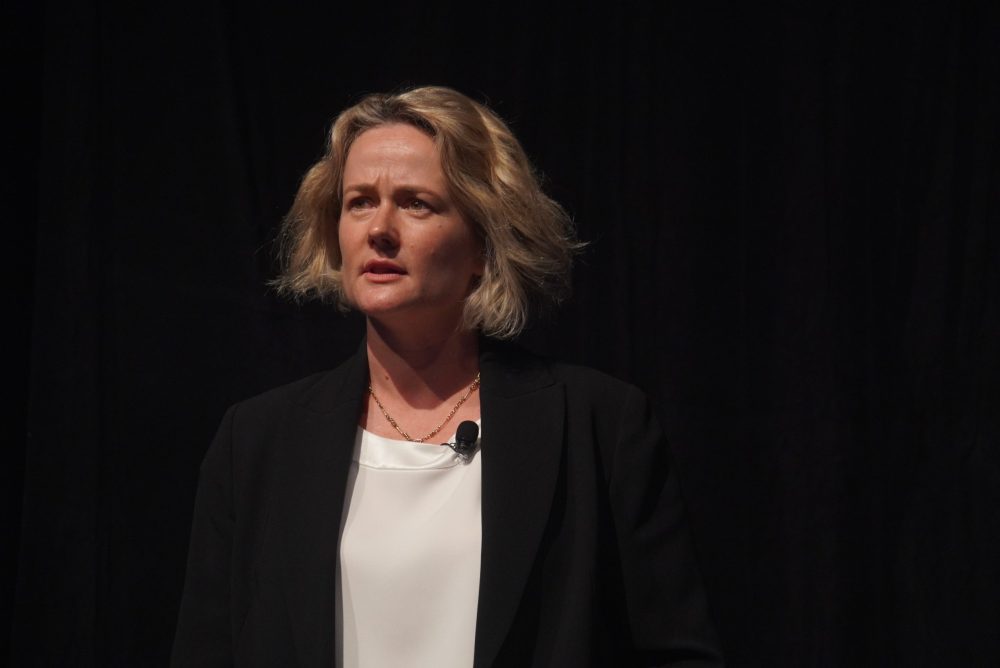WHEN it comes to marketing Australian beef to domestic consumers, the battle between the country’s two biggest supermarket chains, Coles and Woolworths, is alive and well.
The supermarkets both invest significant amounts into consumer research as they look to tailor their shelves to shoppers.

Anna Speer, CEO of Woolworths’ Greenstock red meat supply chain business
The results of some of that research was shared with delegates at the BeefEx conference in Brisbane last week, with a presentation from Anna Speer, the managing director of Greenstock, a business Woolworths set up last year to manage its red meat supply chain.
She gave an insight into strategy of the Greenstock business and highlighted some of the biggest consumer trends.
Health and wellness
The conference heard several sessions on the health benefits of beef with a well-known nutritionist and Meat & Livestock Australia giving a rundown of its influencer program – Beef Central will have more stories on that later in the week.
Ms Speer said Woolworths and Greenstock customers were increasingly conscious of health and wellness and showed some concerns about red meat.
“There are people moving away from red meat because they feel it is not as healthy as some other proteins and want to have more fish or vegetable-based diets,” she said.
“This is a place where we need to get better at telling our story about the nutritional value of red meat.”
Inflation influencing demand
The rise of inflation was a big talking point at the conference, with the cost of lot feeding increasing significantly in the past year and a speech from former treasurer Peter Costello addressing it from a global perspective. Ms Speer said it was coming through in meat sales.
“We are not seeing a lot of people move out of the meat category, but we are seeing some people trade down into pork and poultry – in some instances they are buying a little less,” she said.
“Budget customers are buying things like burger patties and mince. For premium customers, we are still seeing them wanting a premium product, not as much of it and the credentials need to be there – maybe they will buy a T-bone steak for the weekend and not as much meat during the week.”
Ms Speer said customers were increasing interested in snack food and meat snacks were becoming part of it. She said inflation had impacted that market.
“The other day I had a meat protein bar and they are exceptional, they are different to jerky and more like a muesli bar,” she said.
“Inflation has hit this category and we are seeing people start to choose affordability over convenience.”
Sustainability non-negotiable
Both major supermarkets have made significant moves to develop sustainability credentials in their range this year. Ms Speer said sustainability initiatives were a “non-negotiable” for the meat industry.
“Sustainability for us is a journey and we are never going to get there because it will keep evolving,” she said.
“Our customers are looking for it, they’re not saying they are going to pay more for it, but we need to understand it is non-negotiable. Thinking about how we work as an industry to make sustainable supply chains is going to be an important problem to solve.”
Ms Speer said Greenstock had several programs underway to reduce the company’s environmental footprint.
“We are on our third pilot of red seaweed asparagopsis with Future Feed, we have moved from a freeze-dried product to an oil-based product,” she said.
“We have projects in renewable energy and taking plastics out of our supply chain, recently we were first to market with paper-based packs. We also have a project underway using a program called ‘Thesis’ with our suppliers, so that we can unpack what we need to do de-carbonise our supply chain.”
Telling the story of beef
In a bid to generate more discussions about meat marketing, Ms Speer put the call out to BeefEx delegates to give feedback on the way Woolworths and Greenstock were telling the story of Australian beef.
“As an industry we need to get better at telling these stories and I know there is huge work happening in this space,” she said.
“Our customers are asking for it and they are also asking us to help them make better, healthier, sustainable choices that are easy and affordable.”
Ms Speer said Woolworths’ Macro grassfed brand showed the power of telling a good story.
“Macro is one of the fastest growing products in our supply chain, it is bringing new customers into the meat category,” she said.
“I think we need to understand some of the factors that are driving customers into the grassfed space so that we can talk about the benefits of grainfed beef.”

It is not a matter of ‘trading down’ buying chicken and pork, it is not a matter of health. Beef has simply become too expensive in the supermarkets and general butchers. I watch regularly the prices in Alice Springs Woolworths, Coles and butchers. Even expensive chicken breasts rarely over $14/kg, pork maybe $17, decent cuts of lamb and beef are rarely below $25. Even beef mince is now over $13/kg. The shelf area in the majors for sale of beef is shrinking while chicken and pork is increasing. I watch some shoppers and do buy myself a lot more of chicken and pork because beef is so overpriced. I wonder if these people will permanently be lost to beef as their tastes and cooking skills change.